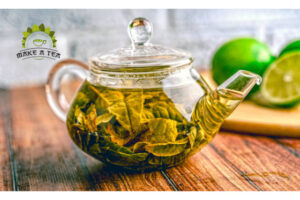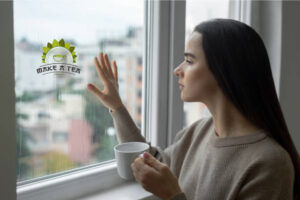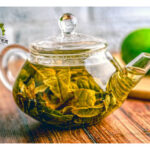The caffeine content in a tea decides whether the tea is good or bad for you. Caffeine in tea can help you feel relaxed and focused. But at the same time, it may harm your health.
In this article, we’ll highlight the caffeine content of different types of tea. Also, the benefits and side effects of the tea with most caffeine.
It will make it clear to you, which tea has the most caffeine? So, choose the best tea that suits you more.
So, let’s get into it and pick the best one for you.
Types of Tea with High Amount of Caffeine
There are multiple types of tea with a high amount of caffeine such as black tea, matcha tea, Pu-erh tea, etc. Also, these teas are consumed by a huge amount of tea lovers all over the world.
So, let’s explore the following list of teas with more caffeine.
1) PU-ERH Tea
The PU-ERH tea is mostly found in the regions of China and considered as aged tea. This tea type has black color to it with a strong earthy flavor and tends to be caffeinated.
The brewing process of the PU-ERH tea plays a vital role in its high caffeine amount. It can contain up to 30-100 mg caffeine per cup.

The preparation time of PU-ERH is almost like black tea. The brewing process of the tea includes hot water with a longer steeping period.
The traditional Sheng PU-ERH has less caffeine, and the Shou PU-ERH has high caffeine. It is because of its fermentation process.
2) Matcha Tea
Matcha tea comes in a powdered form made from stone-ground green tea leaves. The main producer of matcha tea is Japan.
When you’re drinking matcha tea, you’re consuming actual tea leaves; that’s why it’s rich in caffeine. Matcha tea contain 70 mg caffeine in 8 oz. cup of tea.
Moreover, the tea is good for stress relief because it also contains L-THEANINE. Also, matcha tea is good for weight loss.
The plants that produce the matcha tea are mostly shaded. The shading process starts before harvesting season, which increases its caffeine content.
3) Yerba Mate Tea
Yerba mate tea is not related to the Camellia Sinensis tea plant, but it’s rich in caffeine. The tea is popular in countries like Chile and Argentina.
The yerba mate is a spice that comes from the holly plant used to make yerba mate tea. The tea has a high amount of caffeine, like coffee.
yerba mate tea contains 85 mg of caffeine per cup.
Many people consume yerba mate tea in its original form as well as an ingredient in different blends.
4) Black Tea – Tea with the Most Caffeine
Many tea experts consider black tea as the richest caffeinated tea. It largely depends on the steeping process of the black tea.
The blends of black tea is like English breakfast tea, comes from Indian black teas. These types of teas tend to have a high amount of caffeine.
It contains 47 mg of caffeine per 8 oz. serving.
The blends of black tea are often chopped in tea leaves that increase the caffeine content. Moreover, the hotter water and longer steeping period make it the caffeinated tea.

Factors that Cause a High Amount of Caffeine
The amount of caffeine in a tea is based on different attributes. Moreover, it may influence the tea properties itself.
Herbal teas like Greek mountain tea are caffeine free. But many other types of teas have caffeine in them.
The amount of caffeine in a tea may influence by its production process, which includes:
- Variety of Tea
- Harvesting Process
- Growing Methods
- Methods of Processing
- Steep Time
- Temperature of Water
- Tea Leaves
1) Variety of Tea
Every kind of caffeinated tea comes from the same plant known as camellia Sinensis. The plant comes from China, and it has two types first is camellia Sinensis var. Sinensis.
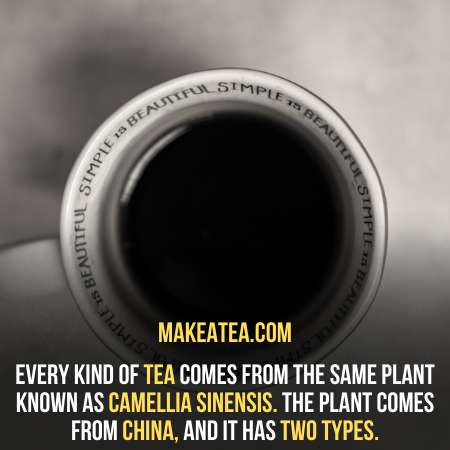
The other kind is Camellia Sinensis var. assamica comes from Assam, India. The types of teas that come from these two variations have a high amount of caffeine.
2) Harvesting Process
The teas that goes through the harvesting process in the summer season have higher caffeine. And, the teas that goes through the harvesting process in the fall have less caffeine content.
The teas with less caffeine are white tea, hokkaido milk tea, and Darjeeling tea. The composition of spring tea includes small leaves, which play a role in its caffeine amount.
3) Growing Methods
The growing process used for the harvesting of the tea can influence the caffeine content in the tea. The method includes shading of the tea before harvesting to make it caffeine-rich.
The growing practices are the main reason that earl grey tea and matcha tea are high in caffeine.
4) Method of Processing
The amount of caffeine in a tea can certainly depend on the processing method. The matcha tea has caffeine because it comes by grinding the green tea leaves into a fine powder.

When you’re drinking a cup of matcha tea, you’re consuming the entire tea leaves. That’s why grounded tea, like Irish breakfast tea, is rich in caffeine.
5) Steep Time – Tea with the Most Caffeine
The caffeine content is mainly based on the steeping time. The tea that goes for a longer steeping period has more caffeine than the other teas.
That’s why black tea has the most caffeine because its steeping period is longer than other types of tea.
The tea that goes through a shorter steeping period has less caffeine, like green tea and white tea.
6) Temperature of Water
The water temperature is one of the most crucial factors in the caffeine content of a tea. The tea that includes boiling water for its brewing has more caffeine than black tea.
The brewing process of green tea includes cold water that’s why it has less caffeine.
7) Tea Leaves
Suppose you want your tea to be high in caffeine, then you need more tea leaves. The more tea leaves, the more caffeine in the cup of tea.
People who want to drink high caffeinated strong tea can add more tea leaves to the infuser.
Many factors influence the amount of caffeine in a tea. We can’t determine the exact amount of caffeine in a tea.
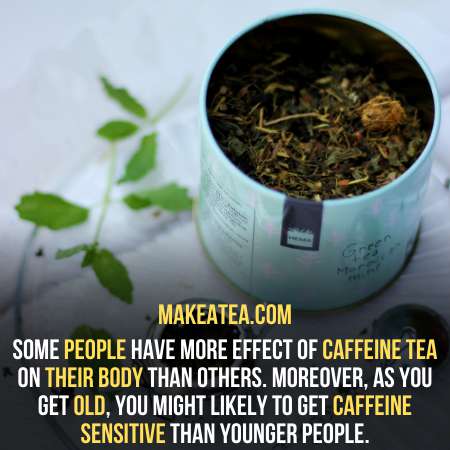
Moreover, we can say that black and matcha tea is caffeine-rich, and white and oolong tea tend to have low caffeine.
Caffeine also has a different impact on different people. Some people have more effect of caffeine tea on their body than others. Moreover, as you get old, you might likely to get caffeine sensitive than younger people.
Benefits of Tea with The Most Caffeine
There is no doubt that people drink coffee to stay awake longer for their work due to caffeine in a coffee. The caffeinated tea works in the same way as the coffee does, but it has a unique ailment.
The tea that comes from Camellia Sinensis is rich in a compound called L-THEANINE. The L-THEANINE compound help in low stress and keeps you active throughout the day.

Many tea lovers consider the combination of caffeine with L-THEANINE best for focus.
Matcha tea and Pu-erh tea are rich in this combination of caffeine and L-THEANINE. The combination makes you energized rather than nervy.
Tea with the Most Caffeine – Side Effects
Caffeine is good for its relaxing properties, but it may cause mild side effects to some people. Older people might not like this tea as they may get sensitive to it.
A high intake of tea can result in diarrhea and severe headaches.
If you keep your caffeine consumption on a moderate level, you can get away from the side effects.

If you want to avoid high caffeinated tea, you can always go for tea with less one, like white tea and oolong tea. With less caffeinated tea, you still can get energy-boosting benefits.
The L-THEANINE compounds present in the tea, along with caffeine, make it refreshing.
You can always go for decaffeinated tea. Teas like white and green tea are best if you suffer from caffeine sensitivity.
Conclusion:
Teas can be a great alternative for people who want to skip on their habit of drinking coffee. Teas like black tea and matcha tea are high in caffeine.
The brewing process and tea plant play a vital role in the caffeine content of a tea. Moreover, caffeine tea is a healthy alternative for coffee drinkers.
The types of teas that we mentioned earlier are some of the best-caffeinated tea. Although caffeine teas are healthy and energizing, there still could be milder side effects.


